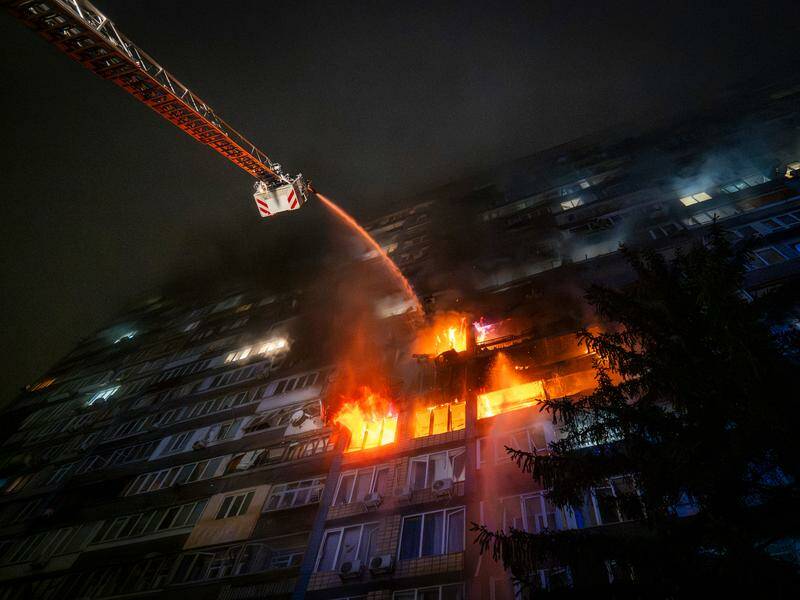
Large parts of Kyiv have experienced extensive power outages following a significant attack by Russian drones and missiles that targeted Ukrainian energy facilities. This escalation, occurring as winter approaches, has left approximately 600,000 households temporarily without electricity across nine regions. The assault also interrupted water supplies and disrupted transport services, including a key metro link across the Dnipro River.
In this latest wave of strikes, a seven-year-old boy was killed in the southeast, and at least 20 other individuals sustained injuries. A residential apartment block in central Kyiv was damaged by a projectile, while residents waited at bus stops on the left bank of the Dnipro, grappling with the metro’s suspension and seeking water at distribution points. As the full-scale war nears its fourth anniversary, many Ukrainians are preparing for a challenging winter ahead.
In recent weeks, Russia has intensified its attacks on Ukraine’s energy infrastructure, targeting power plants and gas facilities. Local authorities are struggling to manage the extensive repairs required. President Volodymyr Zelenskiy emphasized the focus on civilian and energy infrastructure as prime targets for Russian strikes. He called for urgent support from allies, stating, “What’s needed is not window dressing but decisive action—from the United States, Europe, and the G7—in delivering air defence systems and enforcing sanctions.”
During this overnight attack, Russia reportedly deployed over 450 drones and 30 missiles. Ukraine’s air force claimed to have intercepted a significant number of these threats, downing 405 out of 465 drones and 15 of 32 missiles. In contrast, Russia stated that its strikes were a reaction to Ukrainian assaults on Russian civilian facilities. Although Ukraine has conducted drone strikes targeting oil installations in Russia, these operations have been on a smaller scale.
For many residents of Kyiv, the day commenced with power outages, water supply disruptions, and transport delays. Prime Minister Yulia Svyrydenko described the assault as one of the heaviest concentrated strikes on energy infrastructure, highlighting significant damage. By Friday morning, approximately 110,000 consumers in the Kyiv region remained without power, according to Governor Mykola Kalashnyk.
The attack also caused disruptions in the central region of Poltava, affecting around 17,000 consumers, and in northeastern Kharkiv, where 200,000 households lost electricity. The private Ukrainian energy company DTEK reported substantial damage to its thermal power plants, although detailed assessments are pending.
The government expects that the water supply in the capital will be restored by the end of the day, as efforts to repair power infrastructure are underway. Energy Minister Svitlana Hrynchuk noted that this attack coincided with the third anniversary of Russia’s first large-scale assault on Ukraine’s power grid, stating, “Today, Russia continues to use cold and darkness as instruments of terror.”
As winter approaches, the ongoing conflict continues to have severe implications for the civilian population in Ukraine. The government and local authorities are working tirelessly to address the aftermath of these attacks while bracing for the challenges that lie ahead.






